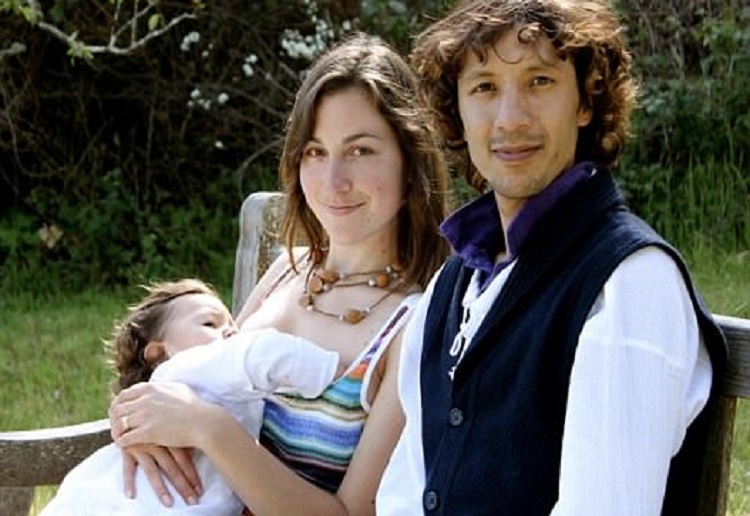What you need to know after Mum of two’s viral story claiming she lives a ‘food-free’ diet – even during pregnancy.
Last week the story of the Akahi Ricardo and Camila Castello went viral. The parents of two young children have claimed they live a ‘food-free’ diet and survive by only eating vegetable broth or fruit a handful of times a week. Including during her pregnancy.
Camila said she practised a ‘breatharian’ pregnancy, only eating solids five times during the nine months she was carrying her first child.
‘Humans can easily be without food, as long as they are the connected to the energy that exists in all things and through breathing,’ Camila said.
‘For three years, Akahi and I didn’t eat anything at all and now we only eat occasionally like if we’re in a social situation or if I simply want to taste a fruit.
‘With my first child, I practiced a Breatharian pregnancy. Hunger was a foreign sensation to me so I fully lived on light and ate nothing.
‘My blood tests during all three trimesters were impeccable and I gave birth to a healthy, baby boy.’
The couple have said they do not force ‘breatharianism’ on their two children.
Akahi said: ‘We would never try to change them and we let them eat whatever they want whether that be juices, vegetables, pizza or ice-cream.
‘We want them to explore the different tastes and have a healthy relationship with food as they grow.’
What the experts say
We have spoke with Natasha Murray, Spokesperson for the Dietitians Association of Australia, to find out some facts about how this lifestyle choice might affect both mum and bub during and after pregnancy.
Is it actually possible to even live such a lifestyle and stay healthy?
We need a range of healthy foods from each of the five food groups to survive and be healthy, and during pregnancy, baby is 100% reliant on Mum to share nutrients from the foods she eats, and fluids she drinks.
It’s not possible to get all of the energy and nutrients we need from the air or environment – we need food and water for this.
Energy restricted diets (in the many forms that they are in) often lead to weight loss due to not eating enough, and can also lead to sickness due to not having enough vitamins and minerals. In some cases, severely restricted diets can lead to death.
What are the dangers of this lifestyle during pregnancy, especially to the foetus?
Healthy eating is important at all life stages, and especially during pregnancy; the growing baby is completely reliant on Mum to receive enough energy and nutrition to grow and develop. If Mum is not eating well enough both her health and baby’s health can be put at risk. This is a time of really fast growth and development for baby, Natasha said.
Pregnancy is NOT the time to try alternative diets, and this one is potentially very dangerous because from the information given, it does not meet any recommendations for any food groups, energy, vitamins and minerals.
The risks for children growing up around this lifestyle? Is it teaching them unhealthy eating habits?
Natasha tells us, it is really important to encourage and foster a healthy relationship with food in our children from birth, and while they are growing up – this guides their future food behaviours; we know that habits formed in the first five years of life are highly likely to continue into adulthood.
A healthy relationship with food means choosing and enjoying a wide range of healthy foods from all food groups, and not feeling guilty for making food choices; all foods (including foods that don’t fit neatly into the five food groups) have a place in our diets.
Kids learn their food habits from their parents and other significant people in their lives – think about some of your own habits, and how often have you done or said something and thought “I’m turning into my Mum”?! Parents have a responsibility to be positive role models, especially with food and having a healthy relationship with food – this way of eating is irresponsible, and could have long term impacts on a child’s relationship with food.
What are the minimum food requirements needed to survive? Does that change throughout pregnancy?
We need energy to keep our bodies moving and our brain thinking. The amount of energy varies based on age, gender, and activity levels (ie a 160cm female who walks every day needs less energy than a 180cm male who walks every day), we need to get this energy from what we eat and drink..
We can get by without food for a short time, but our body looks to other fuel sources in its absence, and after a while, it starts to use our muscles for energy. This can have some not very nice side effects, including not being able to think properly, lack of energy, bad breath and being very grumpy (‘hangry’).
We need enough food to keep our bodies healthy and working properly and able to get through the day, particularly through pregnancy.
During pregnancy, Mums need fuel for not only for themselves, but also the growing baby; and sometimes eating enough with morning/all day sickness can be tricky.
•In the first trimester, we don’t need any extra energy, and can meet requirements by following a normal, healthy diet
•In the second trimester, we need around 1,400kJ extra, which is the equivalent of a chicken salad sandwich
•In the third trimester, we need around 1,900kJ extra, which is the equivalent of a chicken salad sandwich and a banana
So, eating for two isn’t entirely true…..
If you are pregnant with more than one baby, nutrition requirements are increased even more, so please take with your GP or midwife about a referral to an Accredited Practising Dietitian for individual advice about how you can eat enough to keep you all healthy.
Pregnancy is a time to think about eating as healthy as possible to support a growing baby and make sure they grow well, it is not a time to be cutting back on or restricting what you eat.
Breastfeeding also increases nutrition requirements and how much Mum needs to eat to make sure she stays well and is also able to breastfeed successfully.
What are the recommended daily Nutrition requirements? What happens to our bodies when we don’t meet these requirements?
We need a huge variety of nutrients each day including carbohydrates, protein, fats, vitamins, minerals and fibre which are found in a healthy balanced diet made up of fruit and vegetables, lean meat, chicken, fish, or alternatives like tofu and eggs, dairy foods or non-dairy alternatives, and nuts and seeds (the five food groups!). Most of these are increased during pregnancy.
All of these help our bodies work at its best, and each nutrient does different things – such as :
– iron, which is found primarily in red meat and leafy green veggies, which transports oxygen around the body and helps with our energy levels,
– vitamin C, which is found in fruits and vegetables and is important for keeping our immune system working well and wound healing
– Calcium, which is found mainly in dairy foods, bony fish like sardines and almonds and is important for keeping bones and teeth strong, and helping our muscles to work properly.
When we don’t get enough of these nutrients in, our body doesn’t perform at its best, so it’s important to make every mouthful count, to tick off all of your nutrient needs, especially during pregnancy when baby is reliant on Mum to do this for them.
Anything else you think is important to add?
Breastfeeding also increases nutrition requirements, and drinking enough fluid is also very important.
Natasha recommends if you have questions about what to eat while pregnant or breastfeeding, please speak to an Accredited Practising Dietitian who can give you individual advice based on your lifestyle and situation.
Read more – Mum of two claims she lives a ‘food-free’ diet even during pregnancy
What are your main concerns about this lifestyle choice?
Share your comments below.




















-

-
-
mom94125 said
- 06 Oct 2017
-

-
-
natct said
- 20 Jul 2017
-

-
-
june11 said
- 10 Jul 2017
-

-
-
mom183717 said
- 24 Jun 2017
-

-
-
mom160421 said
- 20 Jun 2017
-

-
-
mom90758 said
- 20 Jun 2017
-

-
-
mom101628 said
- 20 Jun 2017
-

-
-
BellaB said
- 20 Jun 2017
-

-
-
nealsq said
- 20 Jun 2017
-

-
-
mom206279 said
- 20 Jun 2017
Post a comment12:17 am
8:39 am
7:52 pm
8:06 am
9:21 pm
8:47 pm
8:20 pm
4:45 pm
11:59 am
11:50 am
To post a review/comment please join us or login so we can allocate your points.